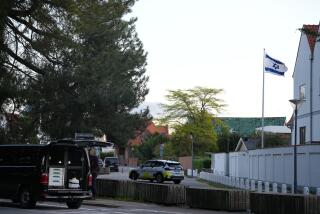10 Immigrants Die in German Blaze; Arson Suspected
- Share via
BERLIN — At least 10 people, four of them children, were killed in a suspicious fire early Thursday morning at a hostel for foreign asylum-seekers in the northern city of Lubeck. Police took three German men into custody.
If the blaze turns out to have been an arson attack, as widely feared, it would be the worst anti-foreigner atrocity in modern German times and would rekindle fading concerns about the safety of foreigners and minorities in this country.
A wave of xenophobic attacks swept Germany in the years immediately following the 1990 reunification of the former East and West. The wave appeared to reach its peak with the 1993 firebombing of a Turkish residence in the western city of Solingen, in which five people were killed, including three young girls.
But the number of attacks here had been declining since 1993, thanks in large measure to amendments made to the national immigration law. The changes substantially reduced the number of asylum-seekers entering Germany, and were thought to have defused much of the anti-foreigner sentiment.
With a family of five still unaccounted for Thursday evening and 30 people in the hospital, including a 6-year-old girl on the brink of death, about 4,000 distraught Lubeck citizens took to the streets to protest.
“This is the worst catastrophe ever to befall our city,” said Mayor Michael Bouteiller, who appeared close to tears before German television cameras.
Bouteiller held up a crumpled paper that he said had been given to him by survivors of the fire, pleading with officials to move them into ordinary apartments where they could live among Germans, and not into special hostels set apart for foreigners.
Asylum-seekers in Germany are routinely grouped together in old industrial buildings, small hostels and vacant East German army barracks. The widely dispersed buildings are extremely hard for the police to patrol and secure, and many of the residents have darker skin than people in surrounding communities, making them easy targets for neo-Nazis.
Bouteiller called for a round-table meeting to be held today, in which he said the foreigners’ request for integrated housing will be given immediate attention. Most of the victims of Thursday’s fire were Africans; Lebanese, Syrians and Poles also lived in the doomed building.
Bouteiller said the authorities suspect arson because the blaze spread with unusual speed. Firefighters were in the neighborhood on another call at the time of the alarm and arrived at the scene in two minutes. The hostel was already engulfed.
It took more than 200 firefighters several hours to extinguish the blaze. Rescue workers said that because of language problems, some of the victims jumped out of upper-story windows before they could be told how to escape safely.
The three men taken into custody had not been formally charged as of Thursday evening. They were not named, but officials said all came from the same village, Grevesmuhlen, about 20 miles east of Lubeck. One, a minor, was said to be wearing the leather clothing, heavy boots and shaved head favored by neo-Nazis.
Lubeck, a Baltic port city, has been the site of several recent neo-Nazi attacks. In March 1994, the city’s synagogue was firebombed the day before Passover, in the first attack on a German synagogue since the pogroms of Nazi times.
Four men were convicted for their roles in that attack, but a month after the sentencing, the synagogue was firebombed again. And when Vice Mayor Dietrich Szameit complained that the arsonists’ sentences were too light, a letter bomb sent to his office blew up in the hands of an aide, sending the man to the hospital.
In September, a Lubeck apartment building where most of the residents were of Turkish origin also was firebombed. Two men were killed in the attack and 21 others were injured.
More to Read
Sign up for Essential California
The most important California stories and recommendations in your inbox every morning.
You may occasionally receive promotional content from the Los Angeles Times.













